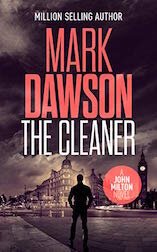The Humanity of the Thriller
It was in the library at Jefferson Junior High School that I made the transition from reading "kids' books" to adult fiction. The Hardy Boys, after years of prepping me, were left behind as a new world of words opened before my eyes.
I strolled the library aisles and came across The Andromeda Strain, one of the earliest novels from soon-to-be-superstar Michael Crichton.
That book introduced me to the thriller genre, and soon I was devouring all the mysteries and thrillers I could find.
But it wasn't until a few years later, when Robert Ludlum released his masterpiece, that I discovered the true power behind the thriller. I finally understood that it wasn't the action - although we do enjoy that - driving our page-turning obsession.
It was the lead character. Specifically, their humanity, or at least their tenuous grasp on it.
Jason Bourne was the character who brought this magic of writing to my attention. Until then I'd never quite comprehended the link a good writer creates between his protagonist and the reader. I'd assumed it was a good plot, solid pacing, and snappy dialogue.
Suddenly I was interested in the people at the heart of the story.
Not yet 20 years old, I devoured The Bourne Identity, then had to wait until I turned 25 for the follow-up.
The suspense and action in the first book might've been enough to interest me in the sequel, but my curiosity about the character sealed the deal.
When I began writing my own novels, it was a lesson I embraced. Because that's where the real power lies in the genre.
Thriller characters, if written properly, connect with readers on emotional levels. They may be sympathetic figures, or they may be enigmatic.
Do you curse them, or are you perplexed by them? Do you find yourself silently - or sometimes aloud, I guess - coaxing them to do, or to not do, something?
It really comes down to this: Do you root for the protagonist of the book?
In Mark Dawson’s excellent John Milton series, you watch a protagonist who’s been wronged - more than once - battle back, constantly coming to grips with who he is, not who others think he is.
This is one of the least understood magnets of a good thriller: The draw of the protagonist through their humanity.
Sure, the package is wrapped in a shell of action and adventure, which helps to build appeal. But it's the depth of the lead character's personality pulling us through chapter after chapter. And, in the case of a series, from book to book.
Some novels in the genre are well suited to be stand-alone books. The story is clever, the action non-stop, and the payoff satisfying.
It takes something special, however, another potent ingredient, to build lasting interest throughout multiple books in a series. The ongoing story must have a character interesting enough—and with enough of a reason for continuing his or her saga—to capture our loyalty.
In science fiction and fantasy they talk about world building, and how vital it is to crafting a winning series.
For the best thrillers, it's character building. An author has to imbue their hero with either a flaw to be managed, or a pain point that desperately needs attention and repair.
Some writing coaches have famously insisted that characters must grow throughout a book or series. I'm not convinced that's always true.
There are times I’m just as captivated watching a character come apart through the course of a series thread, deconstructing themselves in order to find answers.
Is that a fancy way of saying they grow? Perhaps it's mincing words.
I know that Stieg Larsson's series was riveting for one primary reason: We couldn't get enough of Lisbeth, she of the dragon tattoo and the ultra-complex, often destructive, personality.
Are we searching for elements of ourselves in these lead characters? Are we constantly comparing their choices with those we would've made in their place? I think both of those answers are a resounding yes.
It wasn't until I was nearly finished writing the first Eric Swan novel that I realized how vital the question of his humanity was to the series. It led me to go back and not only alter some of the plot, but to introduce an entirely new character who becomes Swan's sounding board.
And, truth be told, the depths to which I can dive within that device are what keep me most interested when writing the books. Oh, the action is fun, and Swan's smart-ass attitude is clearly my own voice.
But how much longer will he be able to hold on to his soul, the part of him that he fears is slowly being corrupted?
I can only trust that this same question is what drives many readers to come along for the ride.
Think about your favorite books, especially those in the thriller genre. What was it about the lead character(s) that intrigued you the most? How much of yourself did you see in them? How much faith did you invest in them?
And how much did you root for them, even when they may have let you down?
This is the true cornerstone of thriller excellence.


